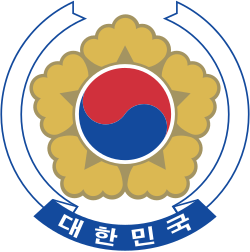| This article is part of a series on |
 |
|---|
Elections in South Korea are held on a national level to select the President and the National Assembly. Local elections are held every four years to elect governors, metropolitan mayors, municipal mayors, and provincial and municipal legislatures.
Contents
- Voting
- Eligibility
- Voting methods
- Election technology
- Schedule
- Election
- Inauguration
- Latest elections
- 2024 legislative election
- 2025 presidential election
- By province and city
- 2022 local elections
- Summary of past elections
- Presidential elections
- Legislative elections
- Local elections
- See also
- Notes
- References
- Further reading
- External links
The president is directly elected for a single five-year term by plurality vote. The National Assembly has 300 members elected for a four-year term, 253 in single-seat constituencies and 47 members by proportional representation. Each individual party willing to represent its policies in the National Assembly is qualified on the legislative (general) election if: i) the national party-vote reaches over 3% on proportional contest or ii) more than 5 members of the party are elected from each of their first-past-the-post election constituencies. [1]











